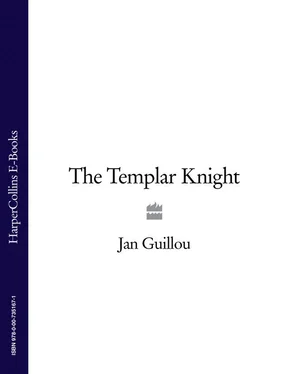Jan Guillou - The Templar Knight
Здесь есть возможность читать онлайн «Jan Guillou - The Templar Knight» — ознакомительный отрывок электронной книги совершенно бесплатно, а после прочтения отрывка купить полную версию. В некоторых случаях можно слушать аудио, скачать через торрент в формате fb2 и присутствует краткое содержание. Жанр: unrecognised, на английском языке. Описание произведения, (предисловие) а так же отзывы посетителей доступны на портале библиотеки ЛибКат.
- Название:The Templar Knight
- Автор:
- Жанр:
- Год:неизвестен
- ISBN:нет данных
- Рейтинг книги:4 / 5. Голосов: 1
-
Избранное:Добавить в избранное
- Отзывы:
-
Ваша оценка:
- 80
- 1
- 2
- 3
- 4
- 5
The Templar Knight: краткое содержание, описание и аннотация
Предлагаем к чтению аннотацию, описание, краткое содержание или предисловие (зависит от того, что написал сам автор книги «The Templar Knight»). Если вы не нашли необходимую информацию о книге — напишите в комментариях, мы постараемся отыскать её.
The Templar Knight — читать онлайн ознакомительный отрывок
Ниже представлен текст книги, разбитый по страницам. Система сохранения места последней прочитанной страницы, позволяет с удобством читать онлайн бесплатно книгу «The Templar Knight», без необходимости каждый раз заново искать на чём Вы остановились. Поставьте закладку, и сможете в любой момент перейти на страницу, на которой закончили чтение.
Интервал:
Закладка:
‘But?’
‘But that is how things have turned out. Odo de Saint Armand is holding a protective hand over you; I think he wants you to move up in the ranks. I’m holding my hand over you too, for what it’s worth. But God was apparently standing by us. Against all rhyme and reason it was you, our Turcopole, who won the position, even though it meant a poor allocation of fighting forces.’
‘And now it turns out that the enemy is coming to Gaza, of all places.’
‘Precisely. God has a plan for everything. May He now stand by you and all your men when the storm comes. When are you leaving?’
‘At dawn. We have much to build in Gaza, and very little time.’
The city of Gaza and its fortress represented the southernmost outpost of the Knights Templar in Outremer. Since the fortress was built, the city had never been besieged, and the armies that had passed by had always been their own, coming from the north on their way to war in Egypt. But now the roles would be reversed; the enemy was not going to be attacked, but would instead attack them. It could be regarded as a sign of the times, a warning that from now on the Christians would have to pay more attention to defence than to offence. They now had an enemy whom they had greater reason to fear than all the men who had come before - men like Zenki and Nur al-Din. But none of these Saracen leaders could measure up to the man who had now assumed leadership: Saladin.
For the new young master of Gaza it was an unusual assignment to be preparing himself for defence. For ten years Arn de Gothia had taken part in hundreds of battles out in the field, but almost always as part of the forces that attacked the enemy first. As a Turcopole he had commanded the mercenary Turkish cavalry who with light arms and light, fast horses rode against the enemy to spread turmoil and confusion. In the best case, the cavalry’s aim was to force the foe to close ranks so that the Frankish forces could attack. At the very least the cavalry would cause the enemy to suffer losses.
Arn had also ridden with the heavily armoured knights, and then the aim was to attack at the right moment and wreak havoc on the order in the enemy’s cavalry by smashing straight through it. Sometimes he’d had to wait with reserve forces out of the fray of battle and not join the action until it was time to decide the situation and win. Or, even worse, a situation arose when a desperate counter-attack from the best troops would gain time for the Frankish army to retreat in an orderly fashion instead turning it into a rout.
Arn had also been involved in a number of sieges at the two previous fortresses where he had been stationed, first as a sergeant in the Templar fortress in Tortosa in the duchy of Tripoli and later as a full brother-knight at Acre. These sieges would sometimes last for months, but they had always ended with the besiegers giving up and pulling back their troops.
But here in Gaza something entirely different awaited them. The important thing now was to make plans and prepare in a new way, as if no previous experience could tell them very much. The city of Gaza included about fifteen villages with Palestinian peasants and two Bedouin tribes. The master of Gaza was thus the lord of all these peasants and Bedouins; he ruled over both their lives and their property.
Consequently the primary concern was to set the right level of taxation for the villages and the Bedouins; he had to raise the tax in years of good harvests and lower it in the meagre years. This year there had been an unusually good harvest, particularly in the lands surrounding Gaza, but much worse in other places in Outremer. This led to a thorny problem, since the master of the castle in Gaza had decreed that the villages be emptied of all their harvest and almost all livestock. The intent, of course, was to save everything from being plundered by the approaching Egyptian army. But it was hard to explain to the peasants when stern-looking Templar knights arrived with columns of empty carts. It looked as if the plundering had already begun, and from the point of view of the Palestinian peasants, it didn’t matter whether they were plundered by Christians or by the faithful.
So Arn spent a lot of time on his horse, riding from village to village to try to explain what was happening. He gave his word that it was not a matter of taxes or confiscation, and that everything would be returned when the plundering army had gone. He tried to explain that the less there was to nourish their enemies in the region, the sooner they would go away. But he found to his surprise that in many villages the people doubted his word.
Then he had a new regulation introduced, proclaiming that every load of grain, every cow and every camel, as well as their calves, should be entered into the books with a receipt. That delayed the whole process, and if Saladin had attacked earlier than planned, all this book-keeping would have cost both the Knights Templar and the peasants dearly. Slowly but surely the villages around Gaza were emptied of livestock and grain. Inside the city walls a great confusion reigned as grain storehouses were filled to overflowing and congestion grew from the constant transports of foodstuffs and livestock.
But this was the most crucial part of the preparations for war. War was more about economics and supplies for an advancing army than it was about bravery on the field. That was the view of the new master of the fortress, even though he avoided communicating such profane ideas to his subordinate knights. Reinforcements began arriving from other fortresses in the country until the forty new knights promised by Jerusalem’s Master were in place inside the walls of Gaza.
The next most important preparation was to widen the moats around Gaza and reinforce the city walls. The first line of defence would be out there, but if it collapsed the people and their animals would take refuge inside the fortress itself. The 280 sergeants and all the hired civilians, even the scribes and customs men, laboured around the clock, using torchlight at night, on this construction work, and the master of the fortress himself made constant inspections of their progress.
Saladin was delaying his attack, but no one understood why. According to the Bedouin spies that Arn sent down to the Sinai, Saladin’s army had assembled in Al Arish, a good day’s march from Gaza. Possibly the delay had to do with the way the war was going up in Syria. The Saracens did have an uncanny way of sending messages from one part of the country to the other, and no one really knew how they did it. The Bedouins in Gaza thought that the Saracen troops were using birds as messengers, but that was hard to believe. The Christians used smoke signals from one fortress to the next, but Gaza lay too far south and was thus prevented from using this system.
The Bedouins who reported back to Arn estimated Saladin’s army at 10,000 men, and the vanguard consisted of Mameluke knights. This was terrible news; such an army would be impossible to defeat on the field. On the other hand, Arn suspected that his spies might be exaggerating, since they were given new assignments and more pay if they brought bad news rather than good.
When almost a month had passed without an attack by Saladin, a certain calm fell over Gaza. They had largely managed to complete their task. They had even begun to distribute grain and livestock to the peasants, who now stood in long, loud queues outside the grain storehouses in the city, the ones that were to be emptied before the storehouses within the fortress walls.
The young master of the fortress was constantly attending to these queues, listening to complaints and trying to resolve misunderstandings and dissension. It was obvious to all that he truly believed that this was not a matter of confiscation of goods but merely an attempt to save the grain from plunder and fire. His intention had been to see to it that each family in every village had enough to live on for a week at a time before they would have to go to Gaza and get more supplies. This way they could also bring along everything edible if they had to flee, leaving only empty villages to the enemy.
Читать дальшеИнтервал:
Закладка:
Похожие книги на «The Templar Knight»
Представляем Вашему вниманию похожие книги на «The Templar Knight» списком для выбора. Мы отобрали схожую по названию и смыслу литературу в надежде предоставить читателям больше вариантов отыскать новые, интересные, ещё непрочитанные произведения.
Обсуждение, отзывы о книге «The Templar Knight» и просто собственные мнения читателей. Оставьте ваши комментарии, напишите, что Вы думаете о произведении, его смысле или главных героях. Укажите что конкретно понравилось, а что нет, и почему Вы так считаете.












